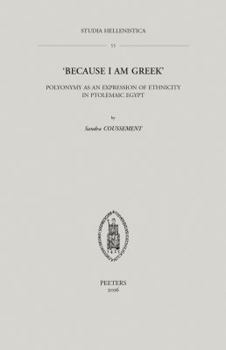'Because I Am Greek': Polyonymy as an Expression of Ethnicity in Ptolemaic Egypt
Double names have a long history in Egypt. They are already attested on Old Kingdom funerary monuments, where concern about eternal life required a correct identification of the deceased. When Greek and Egyptian cultures came into contact under the Ptolemies, bilingual polyonymy (i.e. the combination of an Egyptian and a Greek name) became more popular. During this period, Greek ethnicity was valued as a symbol of power and social status, and was used to create borders between the rulers and the ruled. At the same time, however, it was a flexible concept and this made it a useful tool for crossing the very same boundaries it constructed. As ethnicity became a crucial aspect of one's identity, it is not surprising that bilingual polyonymy was well attested among those that formed a bridge between the ruling class and the Egyptian population: particularly military, administrative and priestly officials. Since they moved between largely separated ethnic contexts, combining names of different linguistic origins was a way to negotiate their ethnic identities. Rather than serving as a reliable source for ethnic origin, names can therefore be interpreted as an expression of the ethnic identity of an individual in a certain space or context.
Format:Paperback
Language:English
ISBN:9042932724
ISBN13:9789042932722
Release Date:February 2016
Publisher:Peeters
Length:449 Pages
Weight:1.46 lbs.
Dimensions:0.8" x 6.1" x 9.4"
Customer Reviews
0 rating





